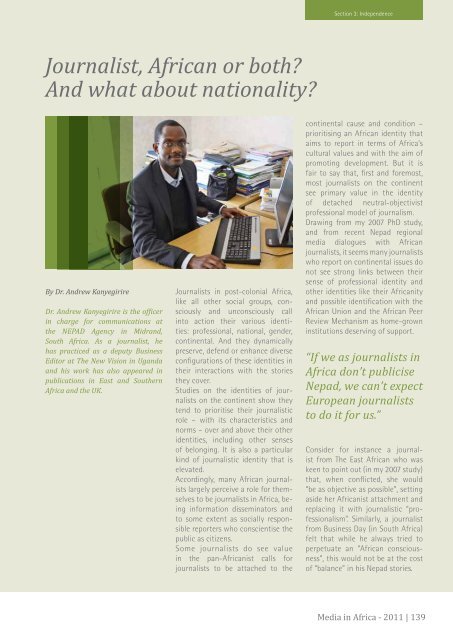Twenty years after the Windhoek Declaration on press freedom
Twenty years after the Windhoek Declaration on press freedom
Twenty years after the Windhoek Declaration on press freedom
Create successful ePaper yourself
Turn your PDF publications into a flip-book with our unique Google optimized e-Paper software.
Journalist, African or both?<br />
And what about nati<strong>on</strong>ality?<br />
By Dr. Andrew Kanyegirire<br />
Dr. Andrew Kanyegirire is <str<strong>on</strong>g>the</str<strong>on</strong>g> officer<br />
in charge for communicati<strong>on</strong>s at<br />
<str<strong>on</strong>g>the</str<strong>on</strong>g> NEPAD Agency in Midrand,<br />
South Africa. As a journalist, he<br />
has practiced as a deputy Business<br />
Editor at The New Visi<strong>on</strong> in Uganda<br />
and his work has also appeared in<br />
publicati<strong>on</strong>s in East and Sou<str<strong>on</strong>g>the</str<strong>on</strong>g>rn<br />
Africa and <str<strong>on</strong>g>the</str<strong>on</strong>g> UK.<br />
Journalists in post-col<strong>on</strong>ial Africa,<br />
like all o<str<strong>on</strong>g>the</str<strong>on</strong>g>r social groups, c<strong>on</strong>sciously<br />
and unc<strong>on</strong>sciously call<br />
into acti<strong>on</strong> <str<strong>on</strong>g>the</str<strong>on</strong>g>ir various identities:<br />
professi<strong>on</strong>al, nati<strong>on</strong>al, gender,<br />
c<strong>on</strong>tinental. And <str<strong>on</strong>g>the</str<strong>on</strong>g>y dynamically<br />
preserve, defend or enhance diverse<br />
c<strong>on</strong>figurati<strong>on</strong>s of <str<strong>on</strong>g>the</str<strong>on</strong>g>se identities in<br />
<str<strong>on</strong>g>the</str<strong>on</strong>g>ir interacti<strong>on</strong>s with <str<strong>on</strong>g>the</str<strong>on</strong>g> stories<br />
<str<strong>on</strong>g>the</str<strong>on</strong>g>y cover.<br />
Studies <strong>on</strong> <str<strong>on</strong>g>the</str<strong>on</strong>g> identities of journalists<br />
<strong>on</strong> <str<strong>on</strong>g>the</str<strong>on</strong>g> c<strong>on</strong>tinent show <str<strong>on</strong>g>the</str<strong>on</strong>g>y<br />
tend to prioritise <str<strong>on</strong>g>the</str<strong>on</strong>g>ir journalistic<br />
role – with its characteristics and<br />
norms – over and above <str<strong>on</strong>g>the</str<strong>on</strong>g>ir o<str<strong>on</strong>g>the</str<strong>on</strong>g>r<br />
identities, including o<str<strong>on</strong>g>the</str<strong>on</strong>g>r senses<br />
of bel<strong>on</strong>ging. It is also a particular<br />
kind of journalistic identity that is<br />
elevated.<br />
Accordingly, many African journalists<br />
largely perceive a role for <str<strong>on</strong>g>the</str<strong>on</strong>g>mselves<br />
to be journalists in Africa, being<br />
informati<strong>on</strong> disseminators and<br />
to some extent as socially resp<strong>on</strong>sible<br />
reporters who c<strong>on</strong>scientise <str<strong>on</strong>g>the</str<strong>on</strong>g><br />
public as citizens.<br />
Some journalists do see value<br />
in <str<strong>on</strong>g>the</str<strong>on</strong>g> pan-Africanist calls for<br />
journalists to be attached to <str<strong>on</strong>g>the</str<strong>on</strong>g><br />
Secti<strong>on</strong> 3: Independence<br />
c<strong>on</strong>tinental cause and c<strong>on</strong>diti<strong>on</strong> –<br />
prioritising an African identity that<br />
aims to report in terms of Africa’s<br />
cultural values and with <str<strong>on</strong>g>the</str<strong>on</strong>g> aim of<br />
promoting development. But it is<br />
fair to say that, first and foremost,<br />
most journalists <strong>on</strong> <str<strong>on</strong>g>the</str<strong>on</strong>g> c<strong>on</strong>tinent<br />
see primary value in <str<strong>on</strong>g>the</str<strong>on</strong>g> identity<br />
of detached neutral-objectivist<br />
professi<strong>on</strong>al model of journalism.<br />
Drawing from my 2007 PhD study,<br />
and from recent Nepad regi<strong>on</strong>al<br />
media dialogues with African<br />
journalists, it seems many journalists<br />
who report <strong>on</strong> c<strong>on</strong>tinental issues do<br />
not see str<strong>on</strong>g links between <str<strong>on</strong>g>the</str<strong>on</strong>g>ir<br />
sense of professi<strong>on</strong>al identity and<br />
o<str<strong>on</strong>g>the</str<strong>on</strong>g>r identities like <str<strong>on</strong>g>the</str<strong>on</strong>g>ir Africanity<br />
and possible identificati<strong>on</strong> with <str<strong>on</strong>g>the</str<strong>on</strong>g><br />
African Uni<strong>on</strong> and <str<strong>on</strong>g>the</str<strong>on</strong>g> African Peer<br />
Review Mechanism as home-grown<br />
instituti<strong>on</strong>s deserving of support.<br />
“If we as journalists in<br />
Africa d<strong>on</strong>’t publicise<br />
Nepad, we can’t expect<br />
European journalists<br />
to do it for us.”<br />
C<strong>on</strong>sider for instance a journalist<br />
from The East African who was<br />
keen to point out (in my 2007 study)<br />
that, when c<strong>on</strong>flicted, she would<br />
“be as objective as possible”, setting<br />
aside her Africanist attachment and<br />
replacing it with journalistic “professi<strong>on</strong>alism”.<br />
Similarly, a journalist<br />
from Business Day (in South Africa)<br />
felt that while he always tried to<br />
perpetuate an “African c<strong>on</strong>sciousness”,<br />
this would not be at <str<strong>on</strong>g>the</str<strong>on</strong>g> cost<br />
of “balance” in his Nepad stories.<br />
Media in Africa - 2011 | 139












